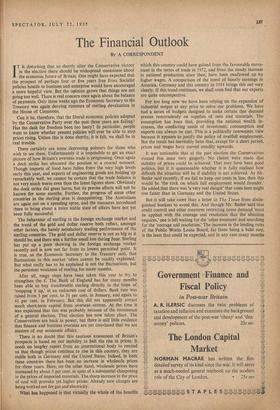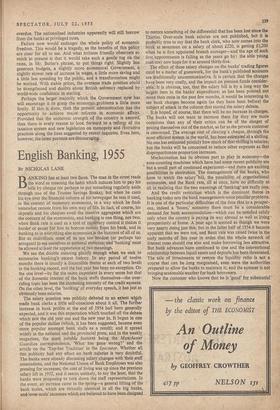The Financial Outlook
B Y ' A CORRESPONDENT IT is disturbing that so shortly after the Conservative victory in the election there should be widespread uneasiness about the economic future of Britain. One might have expected that the prospect of perhaps four or five years free from Socialist policies hostile to business and enterprise would have encouraged a more hopeful view. But the opinion grows that things are not going too well. There is real concern once again about the balance of payments. Only three weeks ago the Economic Secretary to the Treasury was again denying rumours of sterling devaluation in the House of Commons.
Can it be, therefore, that the liberal economic policies adopted by the Conservative Party over the past three years are failing? Has the dash for freedom been too hasty? In particular, people want to know whether present policies will ever be able to stop prices rising. Unless this is done shortly, it is felt, we shall be in real trouble.
There certainly are some depressing pointers for those who wish to see them. Unfortunately it is impossible to get an exact picture of how Britain's overseas trade is progressing. Once again a dock strike has obscured the position at a crucial moment. Though imports of food have fallen from the very high levels early this year, and exports of engineering goods are holding up remarkably well, we cannot be certain that the trade balance is not very much worse even than the latest figures show. Obviously the dock strike did great harm, but its precise effects will not be known for some months. Further, the progress of some other countries in the sterling area is disappointing. The Australians arc again out on a spending spree, and the measures introduced there to bring about a more stable state of affairs have not yet been fully successful.
The behaviour of sterling in the foreign exchange market and the trend of the gold and dollar reserve both reflect, amongst other factors, the barely satisfactory trading performance of the sterling countries. The gold and dollar reserve is not as big as it should be, and there was a further small loss during June. Sterling has put up a poor showing in the foreign exchange market recently and is now not far from its lowest permitted point. It is true, as the Economic Secretary to the Treasury said, that fluctuations in this market 'often cannot be readily explained.' But what really has to be explained is not the fluctuations, but the persistent weakness of sterling for many months.
After all, many steps have been taken this year to try to strengthen the £. The Bank of England has for many months been able to buy transferable sterling directly in the hope of 'mopping it up,' at an unknown cost of dollars. Bank rate was raised from 3 per cent. to 31 per cent. in January, and again to 41 per cent. in February. But this did not apparently attract much short-term capital from overseas centres. At the time it was explained that this was probably because of the imminence of a general election. That election has now taken place. The Conservatives are back in power, but there is still little evidence that finance and business overseas are yet convinced that we are masters of our economic affairs.
There is no doubt that this cautious assessment of Britain's prospects is based on our inability to halt the rise in prices. It needs no lengthy report from an international body to remind us that though prices continue to rise in this country, they are stable both in Germany and the United States. Indeed, in both these countries there has been no increase in wholesale prices for three years. Here, on the other hand, wholesale prices have increased by about 5 per cent. in spite of a substantial cheapening in the prices of imported materials. The sharp increase in the price of coal will provoke yet higher prices. Already new charges are being worked out for gas and electricity.
What has happened is that virtually the whole of the benefits
which this country could have gained from the favourable move- ment in the terms of trade in 1952, and from the steady increase in national production since then; have been swallowed up by higher wages. A comparison of the trend of hourly earnings in America, Germany and this country in 1954 brings this out very clearly. If this trend continues, we shall soon find that our exports are quite uncompetitive.
For too long now we have been relying on the expansion of industrial output at any price to solve our problems. We have had a series of budgets designed to make certain that demand presses remorselessly on supplies of men and materials. The assumption has been that, providing the national wealth in- creases, the conflicting needs of investment, consumption and exports can always be met. This is a politically convenient view because it appears to justify the policy of overfull employment. But the result has inevitably been that, except for a short period, prices and wages have moved steadily upwards.
It was noticeable that at the past election the Conservatives treated this issue very gingerly. No claims were made that stability of prices could be achieved. That may have been good politics, but it is questionable whether it is fully realised how difficult the situation will be if stability is not achieved. As Mr. Butler said recently, if we fail to keep our costs in line, then this would be 'the rock on which full employment would founder.' He added that there was 'a very real danger' that costs here might rise faster than in Germany and the United States.
But it will take more than a letter to The Times from distin- guished bankers to avoid this. And though Mr. Butler said that credit control and other measures restricting home demand 'must be applied with the courage and resolution that the situation requires,' one is left waiting for the 'other measures' and searching for the 'courage and resolution.' The increase in the lending rates of the Public Works Loans Board, far from being a bold step, is the least that could be expected, and in any case many months
overdue. The nationalised industries apparently will still borrow from the banks at'privileged rates.
Failure now would endanger the whole policy of economic freedom. This would be a tragedy, as the benefits of this policy are clear for all to see. And what irritates friendly observers so much at present is that it would take such a gentle tug on the reins, in Mr. Butler's phrase, to put things right. Slightly less generous budgets, a slightly more economical Government, a slightly slower rate of increase in wages, a little more saving and a little less spending by the public, and a transformation might be worked. With stable prices, the overseas trade position could be strengthened and doubts about British solvency replaced by world-wide confidence in sterling.
Perhaps the larger majority which the Government now has will encourage it to grasp the economic problems a little more firmly. If this is done, then the present administration has the opportunity to achieve major reforms in economic affairs. Provided that the economic strength of the country is assured, then there is every reason to look forward to a reform of the taxation system and new legislation on monopoly and restrictive practices along the lines suggested by recent inquiries. Even here, however, the latest portents are discouraging.



















































 Previous page
Previous page